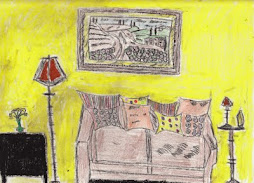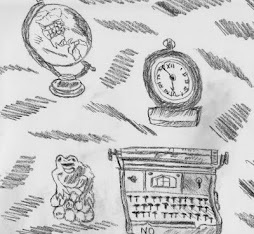Hospitals are known for their unpleasant smells. They produce unflavored odors that you want immediately erased from your senses. I'm not a big fan of hospitals, but as a past medical worker, you have no choice but to accept them. Medical workers must make emotional and physical adjustments to be effective caregivers.
It has been over a decade ago since I last worked in a hospital. I still have vivid memories of the scenery - the smell, touch, voices, and smiles that continue to be everlasting influences in my life. I can remember the first time I entered the elevator to report for duty.
When I pressed the number “3” on the elevator panel, the stress started to boil my mind. There was some good and some bad stress involved. The stress was more in-between the two - centered in the middle. I heard horror stories about patients suffering and then dying off. Many of these patients were nice and genuine people. What I figured out was that being positive is the best strategy for making a difference in caring for patients.
Though the night was still young, I knew that midway through the morning was surely going to be exhausting. The elevator doors slid open. With my back erected, feeling full of energy, and being ready to care for patients. I walked out with confidence.
On the surgical ward, there were many sick patients. Many of them were so depressed that they wanted to be put out of their misery. Their emotions were a tad bit less extreme, but were along the lines of either hoping for a full recovery or to quickly die.
I was saddened. Each day was more painful than the next. There was nothing I could do to save the patients. When they moaned, yelled, grasped, and coughed, just for that one that moment, I wanted to be God. God would know what to do - he always had all the answers. I had to face reality; science and religion could only do so much.
A team of surgeons briefly visited one patient, rushed out, convened, and then moved onto the next patient. They never missed a beat. The surgeons always made their rounds at the same exact time, each and every morning, not wasting time - never delaying a second.
Patients never had enough time to ask the questions they planned the night before. Their lists gave them some hint of hope – being part of a medical miracle so they wouldn't have to follow the light at the end outside of the tunnel. Of course, many questions challenged their religious beliefs.
Should they reject their Mormon faith and take a blood transfusion? Does their prognosis provide a glimmer of hope? Can the cancerous tumor move to a more operable side of the brain? Was there a possible mistake in the ultrasound? None of these questions were simple to ask and the answers weren't any easier.
I occasionally watched the white-coated geniuses move across the shiny floor like mortal Angels. Honestly, I knew their treatment plans were only temporary solutions. Physicians devote the majority of their lives to treating the sick. I knew they deserved credit for their role in patient care. Patients knew that hoping for anything more other then "hopefully", "possibly", and "likely" would only make the grieving process more complex and even somewhat confusing.
Before entering a patient’s room, I straightened my back, kept my head up high and made sure that I always smiled. I would never allow a patient to see through, especially when show any emotional pain would weaken their spirit.
The main goal of patient care is to provide professional service; add some extra compassion into the mix keeps them smiling. Medical workers have to hide their pain. It's sad to think about the process of living and dying. Trying to avoid showing any emotion makes a person feel guilty.
Here I was, questioning why these innocent, kind, and caring people - ones that never did anything to hurt others - were dying. I only hoped that their pain would become an illusion, an imagined dream that freed their mind from reality, giving them an extra second to exhale without clenching down on their abdomen to reduce the retched pain.
One fragile woman, Judy, who had kind eyes, a nice lush smile, and a heart full of love, could barely manage to keep herself upright. She enjoyed sitting on the edge of the bed, but exerted her energy in process, making her exhausted for the rest of the night. Judy had so many lines attached to her; she looked like a medical research experiment.
Judy enjoyed the simple moments. She was always cautious with overexerting herself. Her only wish – each day – was to save her energy so she could walk around the ward. She hoped to visit the Nurse’s Station, at least once a day. Judy never liked being alone in her room. She thought loneliness progressed her condition and made her feel worse. Judy’s simple pleasures were venturing off the ward and to the nearest smoking section to have a smoke and to converse with other people. She was sure a talker. If you were in her presence, you would be doing most of the listening.
As her pain increased and her condition worsened, she was restricted from leaving the ward. She missed having a relaxing moment, smoking a cigarette and talking to people.
While sitting on the side of the bed, Judy's legs started to shake as if she were holding a hundred pounds of weights on her shoulders. Without warning, Judy began to vomit. Her gown was covered in yellowish-green clear liquid. She was always embarrassed. Judy apologized one time too many. It was her fault. The vomiting was an uncontrollable action that was beyond her. When you heard her apologize, you would feel this hollow void in your heart - a sad weeping that lingered on well past your shift and in your dreams.
It was hard to imagine that two years before, Judy was as healthy as any person could hope to be. She used to teach at a local elementary school. The kids loved her. She was one of those teachers that didn’t favor any students. Her philosophy was to establish teamwork, allowing every student to acknowledge helping others. This was how Judy operated in her personal and professional life. Her integrity was limitless. Now, Judy was wasting away. None of her students would be able to recognize her. Judy’s skin was barely attached to her bones.
Judy's stomach cancer had already spread to the surrounding organs. It was only a matter of time before her body would shutdown. The random vomiting sessions were more of a delayed response, which were caused by the gastric acids that swished in and out of her abdominal cavity. The inner lining of her stomach produced a strong acidic taste in her mouth, making her stomach and throat burn so much, she had to dispel the contents.
The Demerol injections were no longer effective in treating her pain. Essentially, the only pain management, the one that delivered her some brief comfort, depended entirely on spirituality. Medical workers and the Reverend stood there on the sidelines; they watched her suffer – witnessing her begging to die. The pain was far too intense for any human to handle. The surgeons could only salvage part of Judy's upper esophagus – giving her a short 2 months to survive. The prognosis was like a death sentence for a crime she didn’t commit.
Judy’s family was nice. Her husband wore glasses, always cracked a smile, and remained positive throughout the process. He knew that his wife’s prognosis was grim, but in having some hope, he understood that giving up wasn’t an option. Judy’s daughter had the same pure smile as her mother. Her personality was most refreshing. She was definitely a rare girl, displaying a natural inner and outer beauty, which was rare to find. She was exhilarating and real - gentle as an Angel. She was organic, no influence could pollute her mind; she looked like one that would always help a person in need of assistance.
Whenever Judy saw her family, her eyes lit up like a church candle. She enjoyed the little time she had left. Her daughter made her last moments magical. She thought of her like a fairy streaming across the room, leaving a trail of magic mist behind/
Judy struggled with accepting her condition. We had long talks. She used to tell me that she wished God could give her another 4 months. I could only look in sadness. As I rubbed on her the top of her fragile shoulder, she pleaded for just one moment, and not a second later. She emotionally vented out, asking to make it to her daughter’s college graduation. This was her only child. She wanted to be there for her.
Tears streamed down, along the sides of her dark, puffy eyes. She shared that she would never be able to watch her daughter walk down the aisle, to see daughter have her first child, and to stare at her glowing face which sparkled like a snowflake in the soft, cold wind. Her moment of truth was near. The end was coming too fast. She knew that she had to accept her fate, come to terms with condition, and enjoy the last fruitful moments with seemliness faith.
Outside the window, leaves blew in the wind. Bare trees aligned near the grassy curbside. Fog outlined the horizon, covering the distant Sun like a white sheet. The coldness stained the window with a frosty drizzle of ice. Time seemed to be speeding up at an accelerated rate. The two months came and gone; they moved quicker than a snap of a finger.
Judy is now gone. She passed away twelve years, two months, three days, four minutes, and exactly two seconds from this very moment. Her memory now lives on in the people that knew her best. People loved Judy with the same compassion that she gave others.
Working in hospitals and in trying to make sense of life is never an easy process. With every new patient there is a moment to reflect about our purpose in life and what out role is to make others feel special. We reserve a place in our hearts for every patient that passes. Their warmth keeps our spiritual center intact.
Judy continues to inspire me from within. She smiles from above, missing the world. She knows that her time on Earth made it possible for others to change. God will be there to provide her comfort. Sweet Judy remains a part of every memory. When you ask for joyful dreams, Judy will grace you with her warm presence - like an Angel of God.
Judy, we will see you again in the end. When you hold your hands out and guide us to Heaven, we will smile at you and say, "Sweet Judy, thank you for showing us the way and for making the journey to Heaven an enlightening and heartwarming experience. We will love you for eternity." Goodbye for now Sweet Judy.
Subscribe to:
Post Comments (Atom)























No comments:
Post a Comment